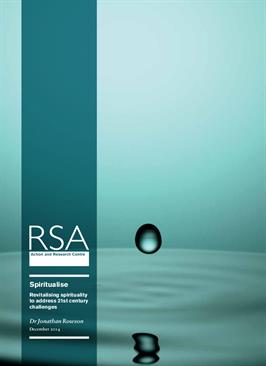In a culture often thought to be shallow, awash with unfettered consumerism, celebrity gossip, status updates and formulaic scandals, and with our world leaders and politicians seemingly incapable of tackling the major problems of our age, such as climate change, inequality and widespread political alienation, the need and appetite for more ‘depth’ is palpable.
To this end, we argue that spirituality should play a greater role in the public realm.
Written by Dr Jonathan Rowson, Director of the RSA’s Social Brain Centre, this report examines how many of society’s problems risk going unaddressed as we struggle to ‘do depth’ in public – it is historically sidestepped by governments and deferred to religions. But at a time of political alienation and democratic stress, it is no surprise that politicians and the public are now seeking to reconnect with their forgotten spiritual roots.
Spiritualise: revitalising spirituality to address 21st century challenges is the culmination of a two-year project funded by the John Templeton Foundation and the Touchstone Trust. The project received contributions from over three hundred experts including atheists, agnostics, and people of various faiths.
Many people think of themselves as having a spiritual aspect to their lives, but without really knowing what that means. This report puts forth that whilst spiritual identification is an important part of life for millions of people, it currently remains ignored because it struggles to find coherent expression and, therefore, lacks credibility in the public domain.
This report recommends that we all rediscover and develop mature forms of spirituality, grounded both in what we can never really know about our place in the universe, and what we can know – and experience – about ourselves. The spiritual injunction is principally an experiential one, namely to know oneself as fully as possible. For many, that means beginning to see beyond the ego and recognise being part of a totality, or at least something bigger than oneself.
Spirituality can be explored in terms of four main aspects of human existence that are often distorted or misrepresented:
- Love – the promise of belonging
- Death – the awareness of being
- Self – the path of becoming and transcendence
- Soul – the sense of beyondness
The report concludes with twelve points to be read as calls to action, but not of the conventional injunctive ‘do this!’ variety. In each case, the suggestion is that most issues in the public realm have spiritual roots that we need to acknowledge, engage with, and ‘bring to the table’ when our personal and professional roles oblige us to think more instrumentally.
pdf 686 KB
Contributors



Join the discussion
Comments
Please login to post a comment or reply
Don't have an account? Click here to register.
I just tried to find out more about the book SPIRITUALIZE and asked Siri for information. Artificial intelligence offered me information about SPIRITUAL LIES. No comment is necessary.
Quite excellent in the way it points toward a new synthesis of what it means to be human. The taproots (not foundations) are humankind's evolved (and evolving) ecological rationality and embodied cognition. It points the way toward a post-rational, post-fundamentalist (both religious and scientific) integration that is compatible with philosophical pragmatism and constructivism and, more generally, with the continental critique of Western instrumental rationalism. There are no sure "foundations", no certainties. There is no "them" (higher authorities) - there is only "us".
I wish that you had thrown more light on that weasel word "balance" as in the phrase "we need a new balance between x and y". Such is the default power of Newtonian thinking, that one immediately thinks of a scale or see-saw. It's more complex than that, because we are not balancing things but processes and processes that often function at very different scales in space and time.
Here it may be helpful to think of an ecological balance. The fire-dependent lodgepole pine forests of North America balance creation and destruction by using fire to open up narrow, deep opportunities for new organisms to come into the hierarchical system, choked with mature trees. Then via fire forest succession, the entrepreneurial first-movers (aka weeds) are steadily replaced by larger-scale plants until the patch is once again dominated by mature pines and the cycle is ready to start over.
It seems to me that this ecological balance yields much better insights into the life of institutions, communities and complex human systems in general - even abstract systems like democracy and capitalism.
Very important work that helps introduce spituality to social issues without the traditional approach.
Dear Nathalie & Jonathan
Congratulations on this superb work! What an enlightening piece have you made. I'm in finishing the 2nd part and I couldn't wait to write this comment. Once I finished it, if possible, I'll love to have a chat with you and how to link it to my ongoing research about quantic humanism.
Bravo!
Carlos